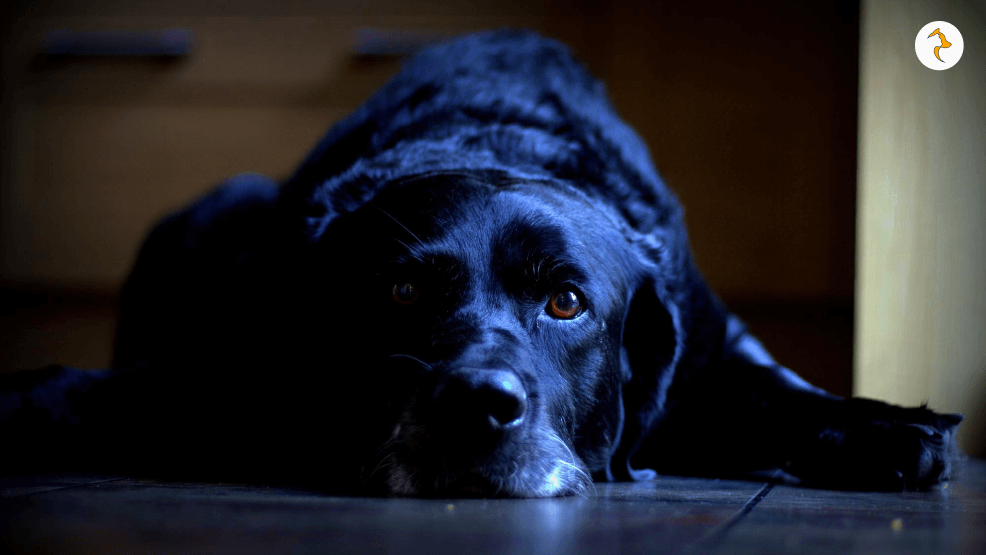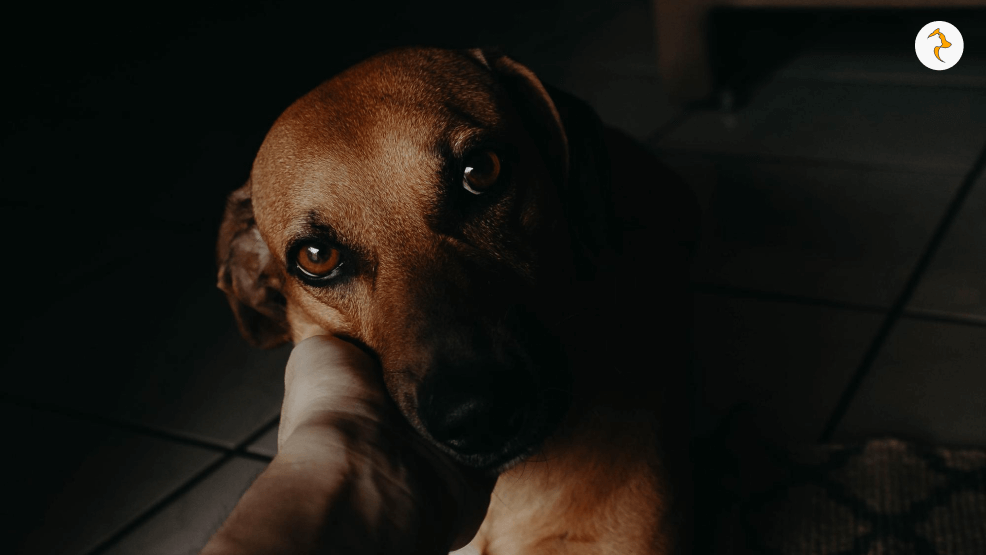Why Is My Dog Crying At Night? Let’s Find Out The Possible Causes


Have you ever been jolted awake in the middle of the night by your dog’s crying? It’s a distressing sound that can make you feel very confused and helpless. But don’t fret! You’re not alone in this. We have all been in the same situation at least once and have wondered the same thing as you, “Why is my dog crying at night.”
So, we are here to help. In this article, we’ll dive into the possible reasons behind those nighttime whimpers and cries and how you can help your furry friend get a good night’s sleep. So, snuggle down with your furbaby, and let’s find out the answer to why do dogs whine at night!
Dog Crying At Night: Possible Causes

Dogs may not be able to talk like us, but they have their own ways of communicating their needs and emotions. So, if they are crying and whining at night, they are trying to tell you something, which can range from physical discomfort to your dog feeling bored and restless. Let’s take a quick look at some of the potential reasons behind “why is my dog crying at night”:
Your Dog Is Hungry
If you have a dog whining at night continuously, then the most probable cause is that your dog is hungry. Dogs, especially growing puppies and active breeds, have hearty appetites and may require more frequent meals or snacks.
So, if your fur baby’s last meal was several hours ago, followed by a good long walk, then chances are they have already digested their food. That means they are hungry again, and your dog’s whining is a sign that they want food.
They Need To Relieve Themselves
Just like us, our dogs have a natural need to relieve themselves regularly. If you are wondering, “why does my dog cry at night” then it is probably because they need to go outside for a potty break. This is especially common in puppies and senior dogs who may have difficulty holding it for extended periods.
They Are Not Comfortable
Dogs are creatures of comfort, and their sleeping environment plays a crucial role in their well-being. If your pup’s bedding is too hard, too soft, or not cozy enough, they may express their discomfort through whining or crying.
Bloating, Upset Stomach, Or Other Digestive Issues
Digestive problems can be a significant source of discomfort for dogs, leading to nighttime crying. Bloating, gas, or an upset stomach can cause pain and distress, prompting your furry friend to seek your attention through vocalization. In some cases, this could be a sign of a more serious underlying condition that requires veterinary attention.
Your Dog Is In Pain
Pain is also another common reason for dogs to cry at night. Your pup may be in pain due to various reasons like an injury, arthritis, or any other medical condition like cancer lumps on dogs. Consequently, they are crying and whining in hopes of receiving relief or comfort from you. Keep an eye on your dog if you suspect your dog is experiencing pain and seek veterinary assistance as soon as possible.
Your Dog Has A Chronic Illness
Chronic illnesses, such as kidney disease, heart conditions, or cancer, can cause significant discomfort and distress in dogs. As these conditions progress, your furry companion may experience increased pain, anxiety, or other symptoms that can lead to nighttime crying episodes.
They Are Suffering From Separation Anxiety
Separation anxiety is a common issue among dogs and can manifest in various ways, including nighttime crying. If your young pup becomes distressed when left alone, they may voice their anxiety through whining or crying, even at night when you’re present but sleeping.
This behavior can stem from a lack of confidence or a strong attachment to their human companions. There are several ways to manage anxiety in dogs, such as proper behavioral training and creating a safe, calm place for your dog. You can also try medication such as trazodone for dogs, but only after consulting with your veterinarian.
Your Dog Is Bored
Believe it or not, boredom can also be a reason for dogs crying at night. If you have a young pup that doesn’t receive enough mental and physical stimulation during the day, they may try to seek your attention for some extra playtime or cuddles by whining or crying at night.
Lack Of Proper Behavioral Training
Lack of proper behavioral training can contribute significantly to a dog’s nighttime whining and crying. This is because dogs are creatures of habit and routine. If they’re not taught to settle down at night, they may resort to whining to get your attention or express their discomfort.
Consistent training can establish clear expectations for nighttime behavior. This includes creating a calm bedtime routine, teaching commands like “place” or “quiet,” and rewarding desired behaviors. By providing structure and positive reinforcement, you can help your dog understand that nighttime is for sleep, not for barking, crying, or whining.
The Age Factor
Finally, you must consider the age factor. This means that if you have a small puppy with a developing bladder and boundless energy, then you can expect some amount of crying and whining at night. The puppy is just learning to communicate its needs. As a result, they may try to whine or cry to alert you that they need to go potty, are hungry, or simply seek comfort and reassurance in their new environment.
Medical Issues
Medical conditions can also be one of the answers to your question, “why is my dog crying at night.” Certain medical conditions in senior dogs, such as arthritis, hip dysplasia, respiratory issues, dental issues, and hearing and vision loss, can be uncomfortable for them, causing them to cry and whine at night.
Additionally, CCD or canine cognitive dysfunction syndrome, a condition similar to Alzheimer’s disease in humans, can cause confusion, disorientation, and changes in behavior in senior dogs. This condition also affects the sleep cycle of senior dogs, leading to increased pacing and vocalization at night.
Environmental factors
The environment in which your dog sleeps can significantly impact their behavior and comfort levels. Loud noises, such as thunderstorms, fireworks, or construction work, can startle and stress your dog, especially if it’s a young pup. This can be another reason for “why is my dog crying at night.”
Similarly, unfamiliar surroundings, like when traveling or staying in a new place, can disrupt your dog’s routine and cause them to vocalize their discomfort. So, when you are looking for the answer to, “why is my dog whining at night all of a sudden,” check whether there have been any changes in your dog’s immediate environment.
Dog Crying At Night? Here Are Some Things You Can Do to Make Them Feel Better

Now that you know the potential reasons behind “why is my dog crying at night,” you can take proactive measures to address the cause and make your furbaby feel more comfortable. Here are some things you can do:
Creating A Comfortable Sleeping Environment For Your Dog
Ensuring your pup has a cozy, comfortable sleeping area can go a long way in reducing nighttime crying. Invest in a high-quality dog bed that provides ample support and cushioning, and place it in a quiet, draft-free area of your home.
If you have a senior dog suffering from arthritis or joint, consider getting a heated dog bed for more comfort.
You can also try using calming pheromone diffusers or sprays to create a soothing atmosphere.
Establishing A Bedtime Routine To Reduce Night Whining
Dogs thrive on routine and establishing a consistent bedtime routine can help minimize nighttime crying. This routine could include activities like a last potty break, a small treat, and a calming activity like gentle brushing or massage. By creating a predictable daily routine for adult dogs and small pups, you can help them feel more relaxed during the day and settled for the night.
Seeking Professional Help For Persistent Night Crying
If your dog’s nighttime crying persists despite your best efforts, it may be time to seek professional help. Consult with a certified animal behaviorist or a veterinary behaviorist to rule out any underlying medical or behavioral issues. They can provide personalized guidance and develop a comprehensive training plan to address your pup’s specific needs.
In A Nutshell
So, there you go! Now you know a whole bunch of answers to your question, “Why is my dog crying at night.” Remember, every dog is different, so what works for one might not work for another.
If you’ve tried everything and your pup is still putting on a midnight show, it might be time to call in the experts – your vet or a professional dog trainer. But don’t lose hope! With patience, understanding, and maybe a few extra treats, you’ll crack the code to those nighttime cries and whines and reclaim your peaceful night’s sleep.
Additional Reading:









Leave A Comment